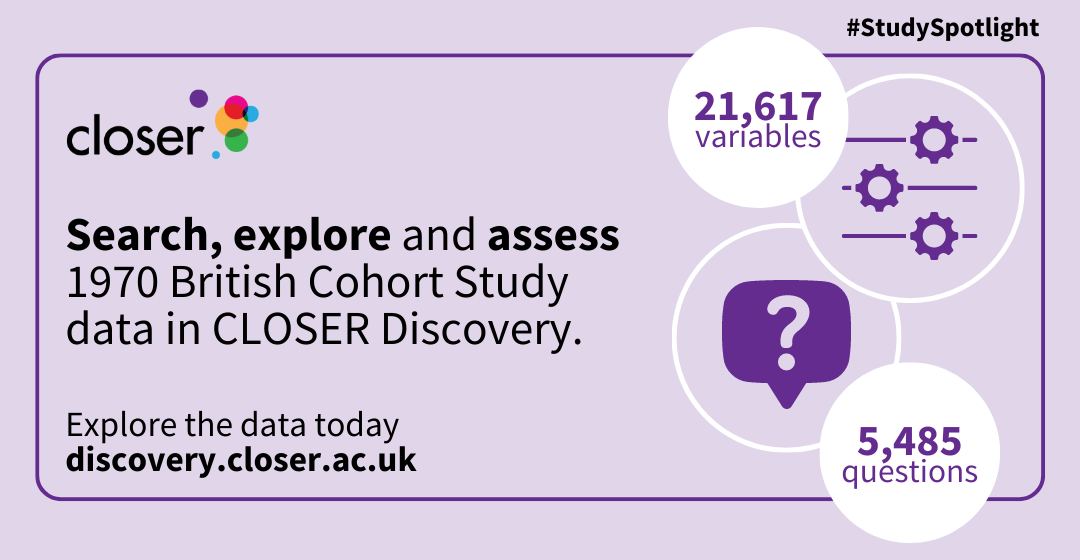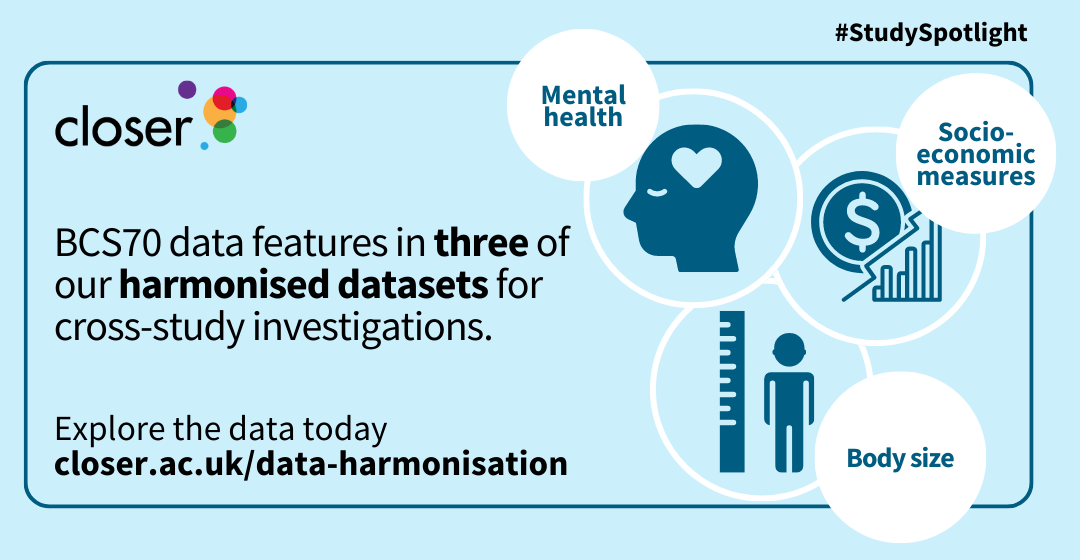 For our latest Study Spotlight instalment, we continue our focus on the CLS-managed British birth cohorts by shining a light on the 1970 British Cohort Study and how you can use CLOSER’s resources to make the most of this data in your research on Generation X.
For our latest Study Spotlight instalment, we continue our focus on the CLS-managed British birth cohorts by shining a light on the 1970 British Cohort Study and how you can use CLOSER’s resources to make the most of this data in your research on Generation X.
About the study
Originally known as the British Birth Surveys, the 1970 British Cohort Study (BCS70) follows the lives of around 17,000 people born in England, Scotland and Wales in the same, single week of 1970.
When the study first began over five decades ago (it celebrated its 50th anniversary in 2020), it had a particular focus on perinatal mortality. However, over time as its participants grew up and moved through the different life stages, the focus broadened. BCS70 is now a vital source of evidence on the challenges and experiences of Generation X, from education and employment, health and wellbeing, to social mobility and economic insecurity.
Recent research using BCS70 data has investigated:
- The gender gap in top jobs and the role of overconfidence
- Prevalence and early-life determinants of multimorbidity
- Early childhood inequalities
To date, the study has completed data collections at 10-time points and the latest participant survey, at age 51, is currently underway. BCS70 data has been linked to administrative data from health records, making the study an even richer resource for researchers to explore.
Discover the data
 With data collections spanning five decades and questionnaires completed not just by the participants, but by their mothers and even their own children, finding the BCS70 data you need for your research can seem like a daunting task. That’s where CLOSER Discovery can lend a helping hand!
With data collections spanning five decades and questionnaires completed not just by the participants, but by their mothers and even their own children, finding the BCS70 data you need for your research can seem like a daunting task. That’s where CLOSER Discovery can lend a helping hand!
CLOSER Discovery is our innovative research tool that enables you to search, explore and assess BCS70 data in an unprecedented level of detail. A filtered search of the BCS70 metadata pulls up detailed information about 5,485 questions and 21,617 variables from the study. Research topics covered include physical health and health behaviours, employment and income, family and social networks, and education.
Response to the COVID-19 pandemic
BCS70 is one of five national longitudinal population studies that worked together during the early stages of the pandemic to conduct bespoke COVID-19 surveys to help understand the impact of the pandemic on their participants. Metadata for all three BCS70 COVID-19 surveys currently available to explore in CLOSER Discovery.
BCS70 data from the COVID-19 surveys is already being cited in numerous research into the pandemic and its impact on Generation X and society as a whole. Recent cross-study research using BCS70 data in conjunction with two other national cohort studies found that ‘British adults aged 50 and older experienced their highest-ever levels of mental ill health during the COVID-19 pandemic’.
Interested in finding out more? You can use our COVID-19 Research Tracker to access all the briefing notes, reports, academic publications and articles that have cited BCS70 COVID-19 data.
Opportunities for cross-study research
Cross-study analysis helps us understand more about group differences, the role of contextual factors and even how societal changes may impact on outcomes for individuals.
We’ve created a series of three cross-study data guides to help your cross-study comparisons. You can use these to explore measures of cognition, diet and physical activity collected within and across multiple longitudinal population studies. Detailed information about the measures collected in BCS70 is included in all three guides.

BCS70 data also features in three of our harmonised datasets, which aim to support researchers to conduct cross-study projects. These include harmonised measures of the following themes, collected across five longitudinal population studies:
Longitudinal research on childhood environment and adult mental wellbeing, which used the harmonised dataset of pre-adolescent characteristics, found that quality of child-parent relationships and parental mental health in childhood are strongly associated with subsequent mental wellbeing in adulthood, even more so than childhood socioeconomic circumstances.
Scratching the surface
This spotlight is only the tip of the iceberg when it comes to using BCS70 and how you can utilise the study for your own research journey. As the study continues, future data collections will be made available to explore in Discovery, new COVID-19 research will be added to our tracker and there will, undoubtedly, be more opportunities for cross-study comparative investigations.
You can keep up to date with all the latest news and developments on BCS70 and the longitudinal research community direct to your inbox, via our monthly newsletter, Longitudinal News.
Further information
This blog is part of our ‘Study Spotlight’ series. This series showcases the CLOSER partner studies, demonstrating how to make the most of these valuable assets through CLOSER’s research resources. Every month, we turn the spotlight on a new theme, producing a series of blogs that delve into the backgrounds of studies that share similar characteristics, such as their study sample, design, or topics of research interest.
‘Study Spotlight’ helps you gain a deeper understanding of the studies in our partnership and how you can better utilise these on your research journey.
Keep an eye out for the next instalment when we shine the spotlight on the 1958 National Child Development Study.
Previous Study Spotlight blogs:
- ALSPAC and the millennial generation (April 2023)
- Next Steps and the millennial generation (April 2023)
- ELSA and the ageing population (May 2023)
- Hertfordshire Cohort Study and the ageing population (May 2023)
- MRC NSHD and the ageing population (May 2023)
- MCS and the British birth cohorts (June 2023)
On Twitter? Follow #StudySpotlight to keep up to date with the series throughout the year.
Related links:
- Follow @CLScohorts on Twitter
- CLOSER BCS70 Study profile
- BCS70 study page on the CLS website
- CLS Video: Introduction to the 1970 British Cohort Study
- CLS training and support
Suggested citation:
Blows, J. (2023). ‘Study Spotlight: BCS70 and the British birth cohorts’. CLOSER. 21 June 2023. Available at: https://closer.ac.uk/news-opinion/blog/study-spotlight-bcs70-and-the-british-birth-cohorts/
